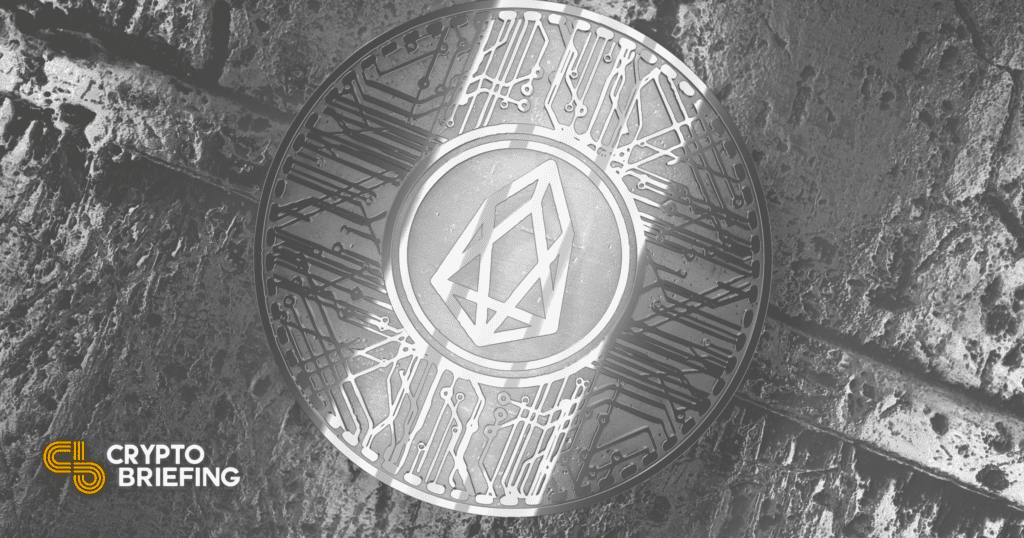
Shutterstock cover by Immersion Imagery.
EOS Community Wants to “Delete” Block.one’s Tokens Worth $196M
Community-backed EOS Network Foundation wants to take away B1's vested tokens, worth about $196 million.
A group representing the EOS community wants to delete vested tokens held by Block.one, claiming the team failed to deliver on promises.
EOS Network Foundation Goes to War Against B1
The ongoing battle between EOS Network Foundation, and the project’s founding team Block.one (B1) has taken a new turn. There is now a raging debate in the EOS community over B1’s vested share of the EOS token supply.
It has been reported that B1’s CEO Brendan Blumer and co-founder Brock Pierce met with the EOS Network Foundation (ENF) to discuss a contention over B1’s vested EOS tokens.
At the network genesis, B1 allocated itself 10% of EOS’s total supply of 1 billion vested over a period of 10 years. Currently, out of a share of 100 million tokens, B1 has access to about 45 million tokens.
B1, the development team behind EOS, raised $4 billion in a 2017-18 initial coin offering (ICO) on the promise of creating a better and faster alternative to Ethereum. Later, EOS failed to find any kind of reasonable adoption. When B1’s technology lead Dan Larimer left, it caused a major blow to the network’s prospects of becoming an “Ethereum killer.” The token has been dwindling ever since in terms of value and overall market capitalization. After years of poor network growth and token performance, the EOS community and block producers (EOS network validators) decided to reboot the project.
Under the leadership of Yves La Rose, a community-backed group EOS Network Foundation (ENF) was created in August 2021 and declared a new roadmap for the EOS ecosystem. In an address to the EOS community, La Rose accused the B1 executives of “negligence and fraud” and said the community planned to distance the blockchain from B1’s centralized control.
In November, B1 said it was entering into an agreement to transfer ownership of the 45 million EOS tokens (worth $196 million) to Helios, a firm owned by B1’s co-founder Brock Pierce. In response, ENF expressed its disapproval and claimed the tokens did not belong to B1 in the first place, as it had failed to deliver on its “social contract” of supporting the network.
Commenting on ongoing negotiations with B1, La Rose said the network consensus is that the tokens held by EOS do not belong to them. In a tweet, he said:
“The gist of the disagreement and why negotiations are happening is that B1 believes the tokens they sold (still vesting) belong to them, while the network through consensus as it exists believes the opposite, those tokens do not belong to B1.”
Update from Yves about the negotiations with B1 #EOS pic.twitter.com/RGyu4sp3Y4
— Yeti (@YetiXBT) November 15, 2021
La Rose wrote further that “the network could remove the vesting code, and the network believes it is within their rights to do so.”
It is not surprising that B1 disagrees with ENF’s claims. B1 co-founder Brock Pierce said the $45 million tokens will be used to grow the EOS ecosystem. On Twitter, Pierce said B1 has many “plans in the pipeline” including a potential launch of an exchange-traded fund (ETF) tied to EOS. In this Twitter thread, Pierce added:
“I don’t think EOS will benefit from authoritarian control over account balances that will undermine property rights, and I think the ecosystem should focus on collaborating together to succeed.”
The community does not appear to be convinced of B1’s stated financial motives. The idea has not resonated with many community members who appear to simply want B1 out of the way. Such members have supported the idea of a takeover at the protocol level. “Just delete them. There’s no good compromise for eos”, one anonymous member wrote. Another member called B1 a scam and that it is “going against their publicly stated commitments.”
As a consequence, ENF, with support from the community, may attempt to fork the EOS software code to change the original token allocation. Otherwise, it is still unclear how ENF can remove B1’s token allocation unless it controls the smart contract used for genesis token deployment. Instead, it is more likely that the two sides will come to a mutually beneficial compromise before a drastic move is made.
